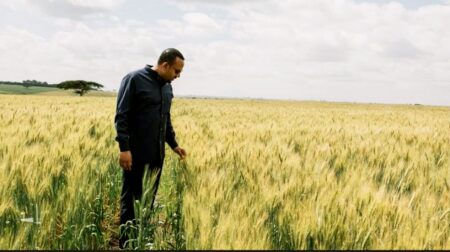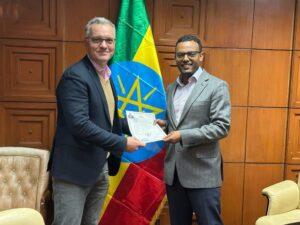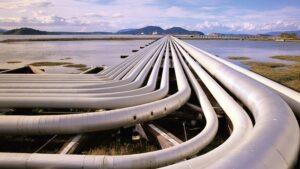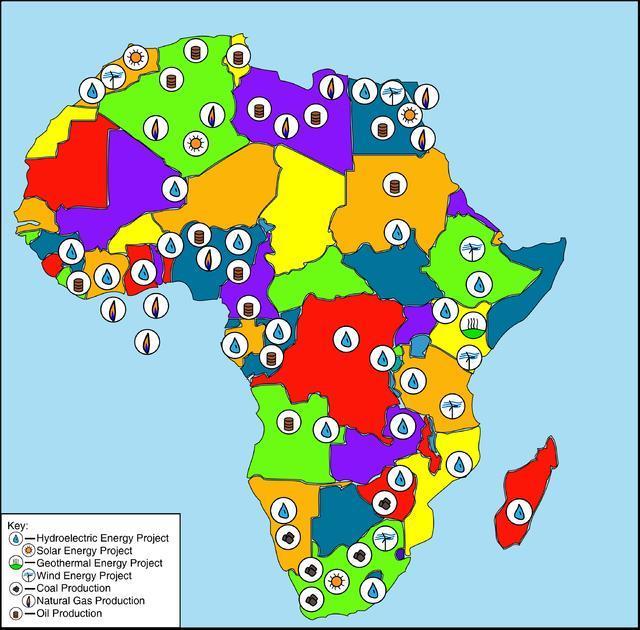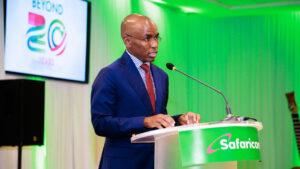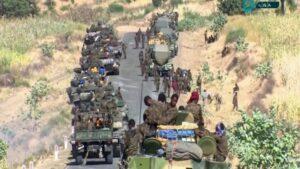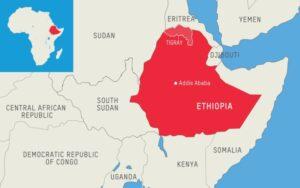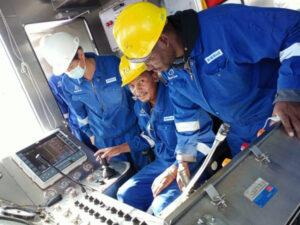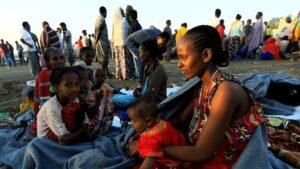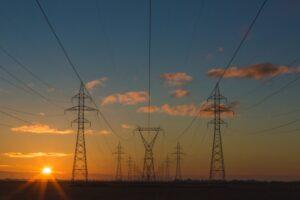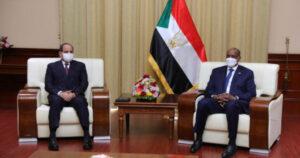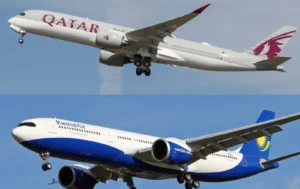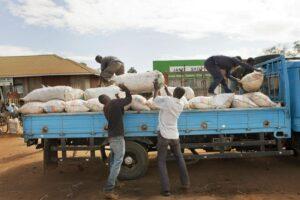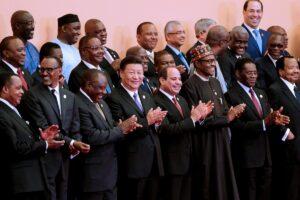- Africa’s new dawn: the rising role of digital and AI in agriculture
- Can Dangote Refinery Transform Africa Energy Ambition
- Gallup Survey: 80 per cent of Kenyan Workers Are Disengaged and Seek New Opportunities
- Madagascar Man Freed from 5KG Tumor After 15-Year Struggle
- How women in Africa are perceived and treated
- Sugar consumption in Kenya to Increase to 1.23 Million Tonnes
- Can Somalia and Turkey Oil deal Bring Change in Somaliland
- Remittances to Kenya dropped to $371.6 million in June, marking a six month low
Ethiopia
- Fresh financing will bolster Ethiopia’s progress in achieving wheat self-sufficiency.
- Data shows Ethiopia’s wheat productivity has struggled to match the demands of a rising population, urbanization, and economic expansion over the past decade.
- Statistics show that Ethiopia’s annual wheat imports average roughly $600 million.
Ethiopia, the second-largest wheat producer in sub-Saharan Africa, has received a significant boost from the African Development Bank (AfDB) in the form of an $84.3 million grant aimed at propelling the nation’s wheat production to new heights.
The grant, a collaborative effort between the AfDB, the Government of the Netherlands, agribusiness firm OCP Africa, and the Global Center on Adaptation, holds the promise of not only enhancing wheat production but also bolstering exports.
CREW initiative in Ethiopia’s wheat production
As wheat gains prominence as a major crop cultivated across the vast expanse of African plains, Ethiopia strategically positions itself as a pivotal player in the sub-sector.…
- Safaricom targets a customer base of at least 10 million across 25 cities in the next year.
- Since Safaricom Ethiopia switched on its mobile telecommunications network, it has grown coverage from an initial 11 to 22 cities.
- Safaricom Ethiopia is building a wholly-owned mobile network and also has infrastructure sharing deal with state-owned Ethio Telecom.
Safaricom is now targeting a customer base of at least 10 million in Ethiopia in the next one year. The move is tailored to shake up the country’s telecommunication industry. (nelsongreerpainting) Latest developments follows huge investments in the country, with cash transfer service M-PESA now on the table.
Since Safaricom Telecommunications Ethiopia switched on its mobile telecommunications network and services in Addis Ababa in October last year, major inroads have been made in the second-most populous country in Africa.
It has grown coverage from an initial 11 cities when it launched to 22. …
Africa has been hailed as the next frontier in the provision of global oil and natural gas resources, especially now in the wake of the ongoing Russia-Ukraine war.
This crisis has not only altered the global energy landscape, but also instigated an inflation in gas prices, given the former’s position in the hierarchy of major global producers. As sanctions continue to soar, Europe has embarked on a quest to find contingency energy supplies, as it seeks to minimize its dependency on Russia; which has already cut off gas supplies to countries like Finland, Poland and Bulgaria, over energy payment disputes.
Consequently, Africa’s gas resources have gained a newly found prominence, pertinently by the European Union (EU); owing to the continent’s rich endowment of oil and deep gas reserves. The mounting global demand for gas, has been pushing international energy companies to reconsider African projects. The numerous ongoing and upcoming oil …
Economically, Ethiopia is on the receiving end after the US government declared that the East African nation had violated the African Growth and Opportunity Act (AGOA) due to the alleged human rights violations in Tigray. This means that Ethiopia will not have duty-free access to US markets if it does not comply by January. If the AGOA privileges are removed, it would lead to an “existential threat” for Ethiopia’s manufacturing sector.
The non-compliance could have come from the publication of the joint Ethiopian Human Rights Commission (EHRC) and OHCHR report on November 3.
Ethnic violence, torture, sexual and gender-based violence, property looting, destruction of infrastructure and religious sites and violations of international humanitarian law and other human rights violations are some of the issues highlighted in the report.…
Kenya Electricity Generating Company PLC (KenGen) says it has surpassed a crucial stage in the ongoing USD 6.2 million geothermal drilling contracts in Ethiopia.
According to the firm’s Managing Director and CEO Rebecca Miano, a team of KenGen engineers have so far crossed the 450 meters of drilling depth of the first of eight geothermal wells for the state-owned electricity producer, Ethiopia Electric Power Company which commenced in May this year.
“The first 450 meters is the most difficult phase of the entire geothermal well drilling process which can go upto a depth of 3,000 meters,” Miano said.
“This particular one is being done under peculiar circumstances including unforeseen delays occasioned by the COVID-19 pandemic,” she added.
The CEO added that they will be drilling at a rate of about 50 meters per day going forward and therefore expect to complete the remaining part on schedule in about two months.…
The fall in consumer demand and closure of retail stores in high income countries due to the COVID-19 pandemic negatively impacted the textile and garment manufacturers in Ethiopia.
This is according to a new report by Deloitte that found that the manufacturing sector’s growth declined from 7.7 percent in 2019 to 7.5percent in 2020 mainly attributed to subdued demand in the key textile and garment sub-sector as a result of the closure of retail stores in high income countries.
A telephone survey by Deloitte found that 4,000 female garment workers revealed that four out of ten garment workers on Ethiopia’s flagship industrial park lost their jobs due to the COVID-19 pandemic in 2020.
The report also found that decline in capacity utilisation pushed firms in the industrial parks to re-invent their business models pivoting to manufacture of personal protective equipment (PPE).
However, a USD 6.5 million fund was set up …
FAO says that in addition to lost agricultural assets, the state of core basic services across northern Ethiopia is impeding relief efforts.
“Electricity and fuel are lacking, cash and credit are not to be found, and there is only one functional road in and out of the region”, noted Paulsen.
According to the organization, the conflict commenced at the peak of what would have been the main Maher season harvest before many households had the opportunity to harvest their crops.…
African Development Bank Group has approved two grants worth $83.6 million to boost cross-border trade in electricity between Ethiopia and Djibouti and to deepen integration in the Horn of Africa sub-region.
In a statement, the bank’s board said the funds comprise a $69.65 million grant to Ethiopia and a second grant of $13.93 million to Djibouti.
Both have been sourced from the African Development Fund, which is the African Development Bank’s concessional financing window.
The Ethiopia–Djibouti Second Power Interconnection project will entail the construction of nearly 300 km of interconnector line, 170 km of transmission lines, and new construction or renovation of substations in the two countries.
Commenting on the approval, Bank’s Director of Power Systems Development Batchi Baldeh said the first interconnection line is reaching its power transfer capacity limit due to several developments in both countries, such as the industrial development in the eastern part of Ethiopia, the …

Ethiopia plans to go ahead with it scheduled second filling of its embattled Grand Ethiopian Renaissance Dam (GERD). When complete, the GERD will be the largest in Africa and have the capacity to produce in excess of 6,000 MW per day.
As expected, Egypt, the historic colonial-era custodian, will not have it and along with Sudan, has called for intervention by the African Union (AU) as well as international bodies and the UN Security Council citing security reasons.
Egypt and Sudan want the UN Security Council to intervene in the GERD owing to what the Sudanese government describes as ‘its impact on the safety and security of millions of people.’
They are of the view that Ethiopia is acting of its own accord and in total disregard of the danger, its actions pose to regional stability. As such, Sudan wrote to the UN Security Council and Egypt has joined the …





